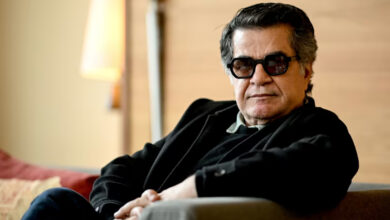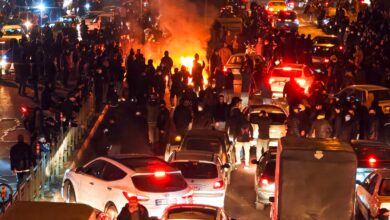News of President Hosni Mubarak’s tour of Kuwait, the United Arab Emirates, and Saudi Arabia dominated the front pages of government papers today, with extra attention to Mubarak’s comments about Iran’s nuclear program and Gulf states reactions.
Al-Akhbar reported that the focus of Mubarak’s talks with Gulf leaders was on “efforts deployed by Egypt to create the context needed to resume the peace process. The negotiations included the Iranian nuclear question.” Al-Ahram‘s coverage also focused on Mubarak’s meetings of the "Iranian nuclear question," which the paper said was discussed in negotiations with Kuwait. "Talks took place based on the Egyptian stance, which supports Gulf states in facing any perils that threaten their security and stability, which are undivided from Egypt’s own national security.”
In its front page headline, the pro-government Rose Al-Youssef wrote that “geography pushes the Iranian question to the top of Mubarak’s negotiations in the Gulf.”
While high-profile negotiations occupied the top of front pages, news of an appearance of the Virgin Mary in some Eastern Cairo neighborhoods also got play. Under a headline that read, “Waiting for Virgin Mary: Christians chant hymns and Muslims read surit mariam,” Rose al-Youssef wrote about “thousands of Egyptians gathering around churches in the districts of Shubra, Zeitun, Ain Shams, Hadayek al-Qubba, al-Marg and Umraneyya to watch lights coming from the sky.” The faithful told the paper’s reporters that “those are the manifestations of Virgin Mary’s blissful appearance.”
The independent Al-Shorouq ran a birds-eye view photo of the faithful waiting for the apparition in Shubra with a caption that read, “Waiting for redemption: hundreds of thousands spent their night in the street of Shubra, Zeitun, Mustorod and Fagalla for the sake of Virgin Mary.” In another dramatic title, Al-Shorouq wrote, “A visitor from heaven brings Egyptians together.”
The ongoing controversy over the border with Gaza continued to make headlines today, with newspapers reporting from the Rafah area. Al-Shorouq wrote about “unprecedented security procedures at the Rafah border crossing.” A national security source told the paper’s reporter that the surveillance on the border is meant to protect Egypt’s security, rather than contribute to the blockade on the Gaza strip.
Al-Wafd, the official newspaper of the party by the same name, focused on the security forces’ efforts to uncover smuggling tunnels used to transfer goods to Gaza from Rafah. The paper revealed that 90 percent of Sinai’s youth work in the tunnel business and that there have been some 67,000 smuggling-related legal cases in North Sinai since the beginning of 2009.
As the year comes to a close, many papers took stock of 2009 and offered speculations on Egypt’s political future in 2010. In a two-page spread, Al-Wafd ran a political recipe feature, asking, “Why is the Egyptian regime afraid from a parliamentarian republic?” The feature stressed on the need for a radical constitutional change that reorganizes the distribution of power, releases stifled freedoms, and reshapes the role of parliament as a watchdog of the government. Al-Wafd ran a Q&A with constitutional expert Tharwat Badawy, in which he emphasized the need for a central parliamentary role to hold the president more accountable and lessen patriarchy and patrimonialism.
In its own two-page spread, Al-Shorouq continued its follow-up coverage after its exclusive interview with Mohamed ElBaradei, former director of the International Atomic Energy Agency and now a possible contender in the 2011 presidential elections.
According to Al-Shorouq, many opposition figures said that the demands ElBaradei made in his interview are justifiable and in line with their own aspirations. ElBaradei demanded legal supervision of the election and a constitutional amendment that makes it possible for any Egyptian to run.
Al-Shorouq also provided a space for the general public to respond to ElBaradei’s comments. One wrote, “He will leave this contest because he is a noble man.” While others wrote, “He is a voice of wisdom” and “He is someone with an enlightened and civilized mentality.”
The independent Youm7 ran a speculative report about ElBaradei’s arrival in Egypt as his term at the IAEA has just ended. The report asked what ElBaradei’s reception would look like. Opposition leaders, such as Ghad Party head Ayman Nour and Constitutional Party leader Mamdouh Qinawy, have said they will gather their supporters to receive ElBaradei at the airport. “The way with which he will be received officially will be an indicator of how the regime will deal with this man in the future: Will the government receive ElBaradei as ex-director of the IAEA and an Egyptian Nobel Prize winner, or will he be received as an opposition figure interested in running in the next presidential election?”




